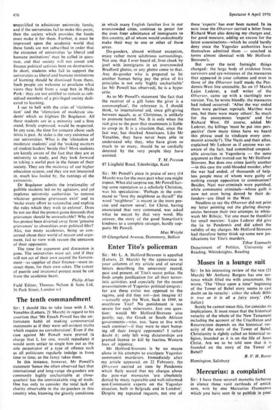The tenth commandment
Sir: I should like to take issue with J. M. Venables (Letters, 21 March) in regard to his assertion that 'Mr Enoch Powell has the un- fortunate habit of making controversial statements as if they were self-evident truths which require no corroboration'. Even if the case against Mr Powell were proved (a charge that I, for one, would repudiate) it would seem unfair to single him out as the sole perpetrator of a type of offence such as all politicians regularly indulge in from time to time, as the fancy takes them.
In this instance, however, Mr Powell's statement 'hence the often observed fact that international and long-range do-gooders are commonly highly uncharitable at close- quarters' has the unmistakable ring of truth. One has only to consider the total lack of charity observable in the do-gooders in this country who, knowing the ghastly conditions in which many English families live in our overcrowded cities, continue to pester for the even freer admittance of immigrants to this country, all of whom would undoubtedly make their way to one or other of these areas.
Do-gooders, almost without exception, enjoy rather more salubrious surroundings. Not one, that I ever heard of, lives cheek by jowl with immigrants in an overcrowded Bradford ghetto, or any ghetto come to that. Any do-gooder who is prepared to let another human being pay the price of his principles is not only 'highly uncharitable' (as Mr Powell has observed), he is a hypo- crite.
As to Mr Powell's statement 'the fact that the receiver of a gift hates the giver is a commonplace', the reference is, I should think, to international aid, since gift-giving between equals, as at Christmas, is unlikely to promote hatred. No. It is only when the rich give to the poor that resentment is liable to creep in. It is a situation that, since the last war, has shocked Americans. Like Mr Venables, they have never been able to understand why they, who have given so much to so many, should be so cordially detested by the very people they have assisted.
T. M. Preston 87 Lingfield Road, Edenbridge, Kent Sir: Mr Powell's piece in praise of envy (14 March) was for the most part what you might expect. What did surprise me, Mr Powell hav- ing some reputation as a scholarly Christian, was his speculation: 'Perhaps in the com- mand to "love thy neighbour as thyself" the word "neighbour" is meant in the most pre- cise and narrow sense': for Christ, having enunciated that very command, was asked what he meant by that very word. His answer, the story of the good Samaritan's kindness to a complete stranger, hardly sup- ports Mr Powell.
Max Wright 19 Glengoland Avenue, Dunnmory, Belfast


































 Previous page
Previous page